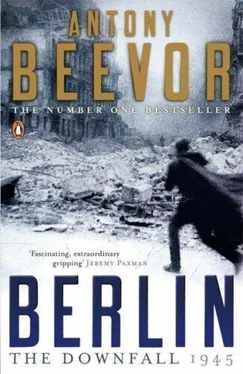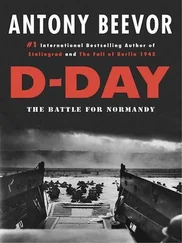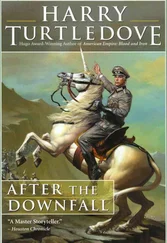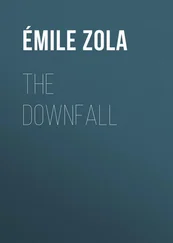Using the findings of Gehlen’s intelligence department, Guderian outlined the Red Army’s build-up for a huge offensive in the east. He warned that the attack would take place within three weeks and requested that, since the Ardennes offensive had now ground to a halt, as many divisions as possible should be withdrawn for redeployment on the Vistula front. Hitler stopped him. He declared that such estimates of enemy strength were preposterous. Soviet rifle divisions never had more than 7,000 men each. Their tank corps had hardly any tanks. ‘It’s the greatest imposture since Genghis Khan,’ he shouted, working himself up. ‘Who is responsible for producing all this rubbish?’
Guderian resisted the temptation to reply that it was Hitler himself who talked of German ‘armies’ when they were the size of a single corps, and of ‘infantry divisions’ reduced to battalion strength. Instead, he defended Gehlen’s figures. To his horror, General Jodl argued that the offensive in the west should continue with further attacks. Since this was exactly what Hitler wanted, Guderian was thwarted. It was even more provoking for him to have to listen at dinner to the verdict of Himmler, who revelled in his new role of military leader. He had recently been made army group commander on the upper Rhine in addition to his other appointments. ‘You know, my dear Colonel General,’ he said to Guderian, ‘I don’t really believe that the Russians will attack at all. It’s all an enormous bluff.’
Guderian had no alternative but to return to OKH headquarters at Zossen. In the meantime, the losses in the west mounted. The Ardennes offensive and its ancillary operations cost 80,000 German casualties. In addition, it had used up a large proportion of Germany’s rapidly dwindling fuel reserves. Hitler refused to accept that the Ardennes battle was his equivalent of the Kaiserschlacht, the last great German attack of the First World War. He obsessively rejected any parallels with 1918. For him, 1918 symbolized only the revolutionary ‘stab in the back’ which brought down the Kaiser and reduced Germany to a humiliating defeat. Yet Hitler had moments of clarity during those days. ‘I know the war is lost,’ he said late one evening to Colonel Nicolaus von Below, his Luftwaffe aide. ‘The enemy’s superiority is too great.’ But he continued to lay all the blame on others for the sequence of disasters. They were all ‘traitors’, especially army officers. He suspected that many more had sympathized with the failed assassins, yet they had been pleased enough to accept medals and decorations from him. ‘We will never surrender,’ he said. ‘We may go down, but we will take a world with us.’
Horrified by the new disaster looming on the Vistula, Guderian returned to the Adlerhorst at Ziegenberg twice more in rapid succession. To make matters worse, he heard that Hitler, without warning him, was transferring SS panzer troops from the Vistula front to Hungary. Hitler, convinced as usual that only he could see the strategic issues, had suddenly decided to launch a counter-attack there on the grounds that the oilfields must be retaken. In fact he wanted to break through to Budapest, which had been surrounded by the Red Army on Christmas Eve.
Guderian’s visit on New Year’s Day coincided with the annual procession of the regime’s grandees and the chiefs of staff, to transmit in person to the Führer their ‘wishes for a successful New Year’. That same morning Operation North Wind, the main subsidiary action to prolong the Ardennes offensive, was launched in Alsace. The day turned out to be a catastrophe for the Luftwaffe. Göring, in a grand gesture of characteristic irresponsibility, committed almost 1,000 planes to attack ground targets on the Western Front. This attempt to impress Hitler led to the final destruction of the Luftwaffe as an effective force. It gave the Allies total air supremacy.
The Grossdeutscher Rundfunk broadcast Hitler’s New Year speech that day. No mention was made of the fighting in the west, which suggested failure there, and surprisingly little was said of the Wunder-waffen. A number of people believed that the speech had been pre-recorded or even faked. Hitler had not been seen in public for so long that wild rumours were circulating. Some asserted that he had gone completely mad and that Göring was in a secret prison because he had tried to escape to Sweden.
Some Berliners, fearful of what the year would bring, had not quite dared to clink glasses when it came to the toast ‘Prosit Neujahr!’ The Goebbels family entertained Colonel Hans-Ulrich Rudel, the Stuka ace and the most decorated officer in the Luftwaffe. They sat down to a dinner of potato soup as a symbol of austerity.
The New Year holiday ended on the morning of 3 January. The German devotion to work and duty remained unquestioned, however improbable the circumstances. Many had little to do in their offices and factories, owing to shortages of raw materials and parts, but they still set out on foot through the rubble or on public transport. Once again, miracles had been achieved repairing the U-Bahn and the S-Bahn tracks, even though few of the carriages had unbroken windows. Factories and offices were also freezing due to smashed windows and so little fuel for heating. Those with colds or flu had to struggle on. There was no point attempting to see a doctor unless you were seriously ill. Almost all the German doctors had been sent to the army. Local surgeries and hospitals depended almost entirely on foreigners. Even Berlin’s main teaching hospital, the Charité, included doctors from over half a dozen countries on its staff, including Dutch, Peruvians, Romanians, Ukrainians and Hungarians.
The only industry which appeared to be flourishing was armaments production, directed by Hitler’s personal architect and Wunderkind, Albert Speer. On 13 January, Speer gave a presentation to army corps commanders in the camp at Krampnitz just outside Berlin. He emphasized the importance of contact between front commanders and the war industries. Speer, unlike other Nazi ministers, did not insult his audience’s intelligence. He disdained euphemisms about the situation and did not shrink from mentioning the ‘catastrophic losses’ sustained by the Wehrmacht over the last eight months.
The Allied bombing campaign was not the problem, he argued. German industry had produced 218,000 rifles in December alone. This was nearly double the average monthly output achieved in 1941, the year the Wehrmacht had invaded the Soviet Union. The manufacture of automatic weapons had risen by nearly four times and tank production nearly fivefold. In December 1944, they had produced 1,840 armoured vehicles in a single month, over half what they had made in the whole of 1941. This also included far heavier tanks. ‘The trickiest problem’, he warned them, was the shortage of fuel. Surprisingly, he said little of ammunition reserves. There was little point producing all these weapons if munitions production failed to keep pace.
Speer spoke for over forty minutes, reeling off his statistics with quiet professionalism. He did not rub in the fact that it was the massive defeats on the eastern and western fronts over the last eight months which had reduced the Wehrmacht to such shortages in all types of weapons. He voiced the hope that German factories might reach a production level of 100,000 machine pistols a month by the spring of 1946. The fact that these enterprises relied largely on slave labourers dragooned by the SS was not, of course, mentioned. Speer also failed to remark upon their wastage — thousands of deaths a day. And the territories from which they came were about to diminish further. At that very moment, Soviet armies numbering over 4 million men were massed in Poland along the River Vistula and just south of the East Prussian border. They were starting the offensive which Hitler had dismissed as an imposture.
Читать дальше











